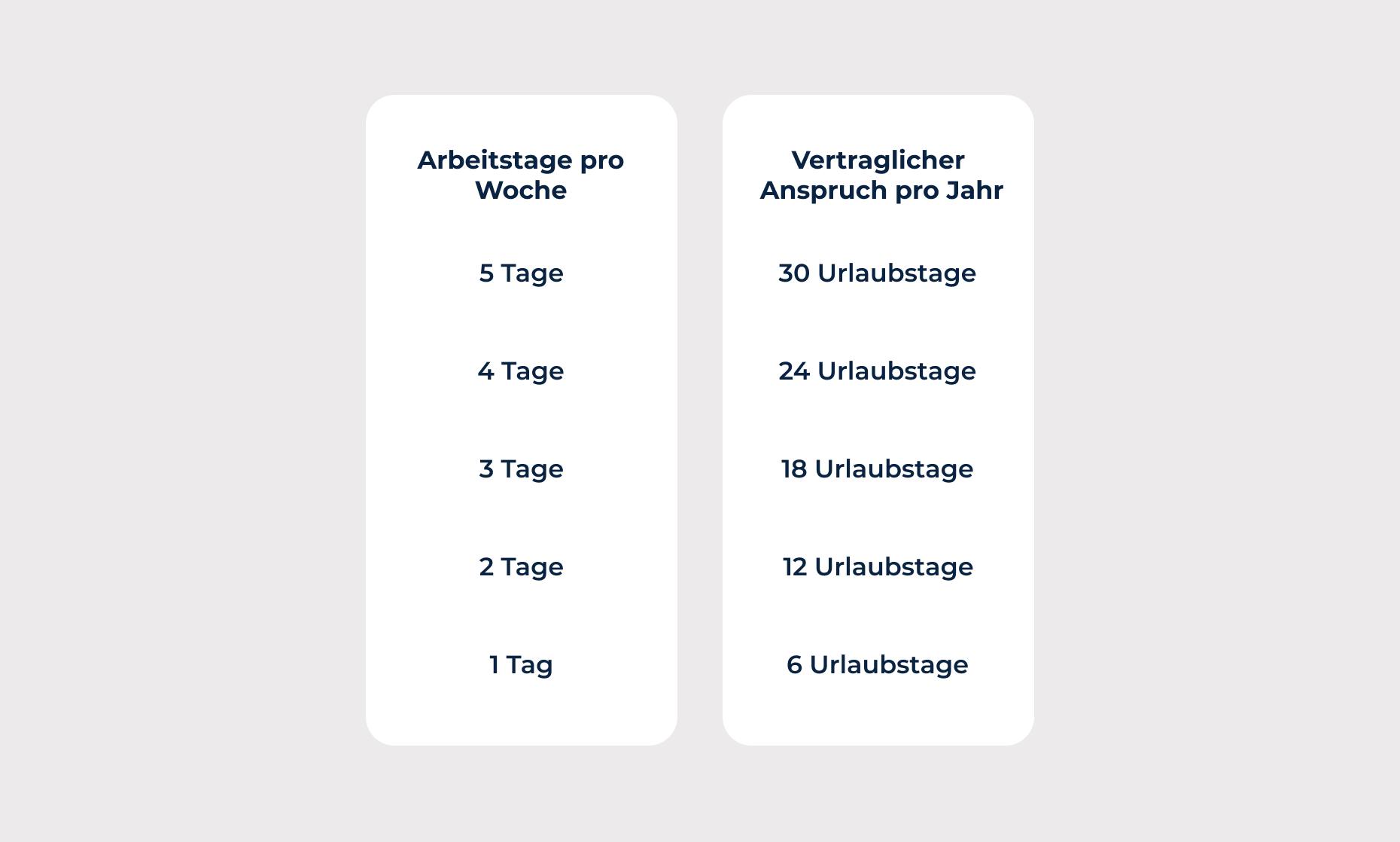As a working student, just like any other employee, you are entitled to paid vacation. The vacation entitlement for working students is legally regulated and depends on the number of working days per week and the duration of the employment relationship.
The Federal Vacation Act (BUrlG) provides for a minimum vacation entitlement of 24 working days per year, which equates to four weeks of vacation with a six-day workweek. This also applies to working students, regardless of whether they work full-time or part-time.
However, within the framework of a working student contract, individual agreements can be made that either increase or decrease the statutory minimum vacation entitlement.
This article explains the legal regulations regarding vacation entitlement for working students as well as the possibilities for individual arrangements in a working student contract. Concrete examples from practice are also provided.
For creating a legally compliant working student contract, you can use our free contract assistant: Working Student Contract as a PDF.

Definition of vacation entitlement as a working student
The vacation entitlement of working students is an important component of the employment relationship and grants the working student the right to take time off from work for rest and personal matters. According to § 3 of the Federal Vacation Act (BUrlG), every employee, including working students, is entitled to paid recreational leave.
The vacation entitlement of working students is an important component of the employment relationship and grants the working student the right to take time off from work for rest and personal matters. According to § 3 of the Federal Vacation Act (BUrlG), every employee, including working students, is entitled to paid recreational leave.
How many vacation days do you have as a working student?
As a working student, you are generally entitled to the statutory minimum vacation, which is regulated in the Federal Vacation Act (BUrlG). The minimum vacation entitlement is 24 working days per year if the working student works on all weekdays.
For a shorter working week, the entitlement is proportionally reduced, though the minimum vacation entitlement must still be at least 20 working days per year. Working days are defined as all calendar days that are not Sundays or public holidays.
However, it is possible to negotiate individual arrangements within the working student contract that may increase or decrease the statutory minimum vacation entitlement. It is important for working students to be aware of their individual vacation entitlements and to understand their rights and obligations within the employment relationship.
I. Legal Basis for Vacation Entitlement for Working Students
Working Student Contract: Statutory Vacation Entitlement
The working student contract typically outlines the statutory minimum vacation entitlement for the working student. The contract should clearly specify the number of vacation days and the conditions for requesting and approving leave.
As mentioned earlier, the statutory vacation entitlement is generally 24 working days per year if the working student works on all weekdays.
However, individual agreements can be made in the contract that increase or reduce the vacation entitlement.
For instance, it is possible to agree on a higher number of vacation days in the contract or reduce the vacation entitlement to increase the weekly working hours.
It is important to note, however, that the statutory minimum vacation entitlement of 20 working days per year cannot be undercut, even in a working student contract.
Do working students have a right to paid vacation?
Yes, working students are generally entitled to paid vacation. The right to vacation is regulated by the Federal Vacation Act (BUrlG) and applies to all employees, including working students.
Vacation is generally paid, meaning that the working student continues to receive their salary during their time off. The amount paid during vacation is based on the average earnings of the last 13 weeks before the vacation begins.
It is important for working students to take advantage of their vacation entitlement, as it grants them the right to rest and recover.
Vacation entitlement can be individually regulated within the working student contract, but the statutory minimum of 20 working days per year cannot be reduced.
Calculating Vacation Days for Working Students
To calculate the number of vacation days for a working student, several factors must be taken into account. Vacation entitlement depends on the weekly working hours and the duration of the employment relationship.
In principle, a working student with a five-day workweek is entitled to a statutory minimum of 20 vacation days per year. If the working student works fewer than five days per week, the vacation entitlement is proportionally reduced.
One method to calculate vacation days is by multiplying the number of weekly workdays by the statutory vacation entitlement per week.
Example for Calculating Vacation Days
For example, a working student who works three days per week is entitled to 12 working days of vacation per year. However, it is important to note that individual agreements in the working student contract may increase or reduce the vacation entitlement.
Formula for Calculating Vacation Days
As a working student, you have a statutory vacation entitlement that depends on your weekly working hours. The formula for calculating this is simple: multiply the number of your workdays per week by 4 to get your annual vacation entitlement.
However, it's important to note that you only become entitled to the full number of vacation days after six months of employment. During the first six months, your vacation is calculated on a pro-rata basis. For example, if you have an annual entitlement of 12 vacation days, you accrue 1 vacation day per month.
In your first month, you can take one day off. If you save your vacation days, you could take 4 consecutive days off by the fourth month. After the sixth month, you are entitled to take the full 12 days at once.

Example: You work an average of 16 hours per week. The annual vacation entitlement for a full-time employee is 30 days, or 240 hours.
To calculate your vacation hours:
240 (full-time vacation hours) x 16 (your weekly hours) ÷ 40 (full-time weekly hours) = 96 vacation hours.
Applying for Vacation as a Working Student
As a working student, you are entitled to vacation, but there are a few things to keep in mind when requesting your time off. First, find out how many vacation days you are entitled to by law.
As a working student, you are only entitled to the full vacation after six months of employment. Before that, your vacation is calculated proportionally. This means you are only entitled to a portion of the vacation days. You should also be aware that your supervisor must approve your vacation and may require you to work on certain days. To avoid conflicts, it’s advisable to discuss your time off as early as possible.
If you have irregular working hours in your student job, it can be useful to choose the timing of your vacation carefully to maximize your earnings.
For variable weekly hours, your vacation pay is not based on your hourly wage, but on the average payment of the last 13 weeks. Therefore, it’s best to apply for vacation after periods when you’ve worked more, such as toward the end of the semester break.
In general, the better you coordinate your vacation planning with your employer, the more you will benefit from your days off. Plan your vacation carefully and submit your request in good time to ensure optimal time off.
Steps to Apply for Vacation as a Working Student:
- Check Your Vacation Entitlement: Find out how many vacation days you are entitled to as a working student. Keep in mind that you are only entitled to the full vacation after six months of employment. Before that, you will only accrue vacation proportionally.
- Talk to Your Supervisor: Your employer must approve your vacation. Therefore, you should discuss your desired vacation period with your supervisor in advance. If you inform them early, the company can plan better, and potential conflicts can be avoided.
- Consider the Company’s Needs: The company may need your labor at certain times, such as during periods of high workload or peak seasons. Therefore, when choosing your vacation period, you should consider your employer’s needs and, if necessary, choose another time.
- Follow the Rules in Your Working Student Contract: Your contract may contain specific regulations regarding vacation, such as notice periods or the distribution of vacation days. Make sure you know and follow these regulations.
- Mind Your Pay: If you have irregular working hours in your job, you should choose the timing of your vacation wisely. For fluctuating weekly hours, your vacation pay is based on the average payment of the last 13 weeks, not your hourly wage. Therefore, it’s best to submit your vacation request after a period of high work hours when your average earnings are higher..
What Does the Lecture-Free Period Mean for Working Students?
The lecture-free period, also known as the semester break, has various implications for working students. During this time, many students have more free time and may want to work more hours in their student jobs. However, they should keep in mind that they are still entitled to vacation and should take it to ensure proper rest.
It’s also important to know that the rules regarding weekly working hours for working students are more flexible during the lecture-free period.
This means that students are allowed to work more hours per week during this time than during the semester. However, the exact regulations differ from state to state and should be checked beforehand.
It’s also important to note that not all students want or are able to work during the lecture-free period.
Some have exams or need to write papers and require this time for preparation. In this case, they should discuss their availability with their employer in advance to avoid conflicts.
Was ist ein gutes Werkstudenten Gehalt?
A good salary for a working student depends on various factors such as the industry, the company, the region, and the specific tasks the student takes on within the company. On average, working students in Germany earn around 11 to 13 euros per hour.
However, there are also positions that pay higher hourly wages, especially in fields like IT or engineering.
As the salary increases, taxation of the wage may also change.
A good working student salary is one that is fair and appropriate in relation to the workload and the requirements of the role. It is worthwhile to compare the offered wages with similar positions in the same industry and region, and potentially negotiate to ensure a fair salary.
More Articles:





